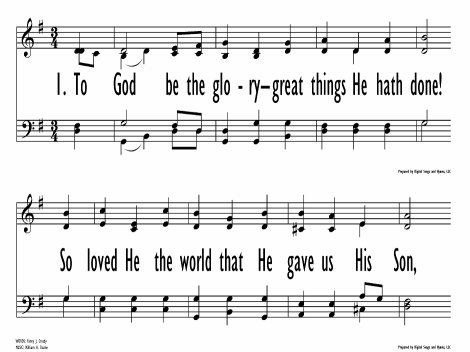Prodigious writer of hymn texts, Fanny J. Crosby (b. Putnam County, NY, 1820; d. Bridgeport, CT, 1915) wrote this hymn, which was first published with Doane's tune in Songs of Devotion (1870). This text and "Blessed Assurance" (490) are among the best-known and most-loved hymn texts of the thousands Crosby produced. Initially ignored in the United States, the hymn was sung in British churches after its inclusion in Ira D. Sankey's Sacred Songs and Solos (1903). Because of its use in the Billy Graham Crusades beginning in 1954, the hymn gained great popularity in Britain and Australia as well as in the United States.
In contrast to many gospel hymns (including the majority of Crosby's texts), “To God Be the Glory” directs our attention away from personal experience to the glory of God. God so loved the world that he gave us his Son to make atonement for sin (st. 1); all who believe in Christ will receive pardon (st. 2) and will rejoice now and through all eternity because of the "great things he has done" (st. 3). The refrain borrows its praise in part from the Old Testament psalms. The phrase "when Jesus we see" (st. 3) must have meant something special to Crosby, who was blinded when she was seven weeks old.
Fanny (Francis) Jane Crosby attended the New York City School for the Blind, where she later became a teacher. She began writing poetry when she was eight and publishing several volumes, such as A Blind Girl, and Other Poems (1844). Married to musician Alexander Van Alstyne, who was also blind, Crosby began writing hymn texts when she was in her forties. She published at least eight thousand hymns (some under various pseudonyms; see PHH 427); at times she was under contract to her publisher to write three hymns a week and often wrote six or seven a day. Crosby's texts were set to music by prominent gospel song composers such as William B. Bradbury (PHH 114), William H. Doane, Robert S. Lowry (PHH 396), Ira D. Sankey (PHH 73), and William J. Kirkpatrick (PHH 188). Her hymns were distributed widely and popularized at evangelistic services in both America and Great Britain. Crosby was one of the most respected women of her era and the friend of many prominent persons, including presidents of the United States.
Scripture References:
st. 1 = Ps. 126:2-3, John 3:16, 1 John 2:2, Matt. 7:13-14
ref. = John 14:6
Prodigious writer of hymn texts, Fanny J. Crosby (b. Putnam County, NY, 1820; d. Bridgeport, CT, 1915) wrote this hymn, which was first published with Doane's tune in Songs of Devotion (1870). This text and "Blessed Assurance" (490) are among the best-known and most-loved hymn texts of the thousands Crosby produced. Initially ignored in the United States, the hymn was sung in British churches after its inclusion in Ira D. Sankey's Sacred Songs and Solos (1903). Because of its use in the Billy Graham Crusades beginning in 1954, the hymn gained great popularity in Britain and Australia as well as in the United States.
In contrast to many gospel hymns (including the majority of Crosby's texts), “To God Be the Glory” directs our attention away from personal experience to the glory of God. God so loved the world that he gave us his Son to make atonement for sin (st. 1); all who believe in Christ will receive pardon (st. 2) and will rejoice now and through all eternity because of the "great things he has done" (st. 3). The refrain borrows its praise in part from the Old Testament psalms. The phrase "when Jesus we see" (st. 3) must have meant something special to Crosby, who was blinded when she was seven weeks old.
Fanny (Francis) Jane Crosby attended the New York City School for the Blind, where she later became a teacher. She began writing poetry when she was eight and publishing several volumes, such as A Blind Girl, and Other Poems (1844). Married to musician Alexander Van Alstyne, who was also blind, Crosby began writing hymn texts when she was in her forties. She published at least eight thousand hymns (some under various pseudonyms; see PHH 427); at times she was under contract to her publisher to write three hymns a week and often wrote six or seven a day. Crosby's texts were set to music by prominent gospel song composers such as William B. Bradbury (PHH 114), William H. Doane, Robert S. Lowry (PHH 396), Ira D. Sankey (PHH 73), and William J. Kirkpatrick (PHH 188). Her hymns were distributed widely and popularized at evangelistic services in both America and Great Britain. Crosby was one of the most respected women of her era and the friend of many prominent persons, including presidents of the United States.
Liturgical Use:
Suitable for many worship services as a superb hymn of praise for God's mighty acts of redemption in Christ; baptism; profession of faith; assurance of pardon.
--Psalter Hymnal Handbook


 My Starred Hymns
My Starred Hymns







